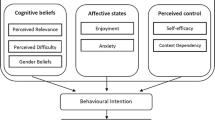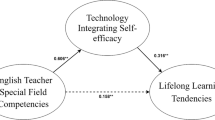Abstract
This study examines the effect of the student teaching experience on preservice elementary teachers’ self-efficacy beliefs and the sources of their beliefs about technology integration in teaching in the UAE. The participants were 62 pre-service elementary teachers at the United Arab Emirates University. Pre- and post-survey was administered to examine participants’ self-efficacy beliefs for technology integration prior to and at the end of the teaching experience. Additionally, a purposeful subset of the sample (n = 16) were interviewed based on their high self-efficacy belies to explore the sources of the high self-efficacy beliefs. Results showed a significant effect of student teaching experiences on participants’ judgment of their self-efficacy about technology integration. Mastery experience and vicarious experience reported to be the most influential sources of self-efficacy to integrate technology among preservice elementary teachers.
Similar content being viewed by others
References
Abbitt, J., & Klett, M. (2007). Identifying influences on attitudes and self-efficacy beliefs towards technology integration among preservice educators. Electronic Journal for the Integration of Technology in Education, 5, 28–42.
Albion, P. R. (1999). Self-efficacy beliefs as an indicator of teachers’ preparedness for teaching with technology. In J. D. Price, J. Willis, D. A. Willis, M. Jost, & S. Boger-Mehall (Eds.), Technology and teacher education annual 1999 (pp. 1602–1608). Charlottesville, VA: Association for the Advancement of Computing in Education.
Albion, P., & Ertmer, P. (2002). Beyond the foundations: The role of vision and belief in teachers’ preparation for integration of technology. Technology Trends, 46(5), 34–38.
Alghazo, I. (2006). Quality of internet use by teachers in the United Arab Emirates. Education, 126(3), 769–781.
Almekhlafi, A., & Almeqdadi, F. A. (2010). Teachers’ perceptions of technology integration in the United Arab Emirates school classrooms. Educational Technology & Society, 13(1), 165–175.
Anderson, S., & Maninger, R. (2007). Preservice teachers’ abilities, beliefs, and intentions regarding technology integration. Educational Computing Research, 37(2), 151–172.
Aydin, S., & Boz, Y. (2010). Preservice elementary science teachers’ science teaching efficacy beliefs and their sources. Elementary Education Online, 9(2), 694–704.
Bandura, A. (1986). Social foundations of thought and action: A social cognitive theory. Englewood Cliffs, NJ: Prentice-Hall.
Bandura, A. (1994). Self-efficacy. In V. S. Ramachaudran (Ed.), Encyclopedia of human behavior (Vol. 4, pp. 71–81). New York: Academic Press.
Bandura, A. (1997). Self-Efficacy: The exercise of control. New York: W. H. Freeman &Company.
Bogdan, R., & Biklen, S. (1998). Qualitative research for education: An introduction to theory and methods (3rd ed.). Boston: Allyn and Bacon.
Britner, S., & Pajares, F. (2006). Sources of science self-efficacy beliefs of middle school students. Journal of Research in Science Teaching, 43, 485–499.
Burns, R. B. (2000). Introduction to research methods (4th ed.). Australia: Longman.
Choy, D., Wong, A., & Gao, P. (2008). Singapore’s preservice teachers’ perspectives in integrating information and communication technology (ICT) during practicum: Proceedings of AARE Conference 2008, 30 Nov to 4 Dec. Brisbane. Retrieved February 28, 2010, from http://www.aare.edu.au/08pap/cho08326.pdf.
Compeau, D., Higgins, C., & Huff, S. (1999). Social cognitive theory and individual reactions to computing technology: A longitudinal study. Management Information Systems Quarterly, 23, 145–158.
Downes, T. (1993). Student-teachers’ experiences in using computers during teaching practice. Journal of Computer Assisted Learning, 9, 17–33.
Erdem, M. (2007). Self-efficacy levels of teachers in information and computer literacy. World Applied science Journal, 2 (4), 399–405. Retrieved June 17, 2010, from http://www.idosi.org/wasj/wasj2(4)/20.pdf.
Ertmer, P. A., Conklin, D., Lewandowski, J., Osika, E., Selo, M., & Wignall, E. (2003). Increasing preservice teachers’ capacity for technology integration through use of electronic models. Teacher Education Quarterly, 30(1), 95–112.
Ertmer, P., & Ottenbreit-Leftwich, A. (2010). Teacher technology change: how knowledge, confidence, beliefs, and culture intersect. Journal of Research on Technology in Education, 42(3), 255–284.
Faculty of Education. (2003). Student teaching Manual. Al-Ain: Office of Field Experiences, United Arab Emirates University.
Fleiss, J. (1971). Measuring nominal scale agreement among many raters. Psychological Bulletin, 76, 378–382.
Gaither, C. (2005). Professional development as a means to increasing teachers’ selfefficacy for technology integration. Unpublished Dissertation, Auburn University, Auburn. Retrieved from ProQuest Digital Dissertations. (AAT 3173482).
Gencer, A., & Cakiroglu, J. (2007). Turkish preservice science teachers’ efficacy beliefs regarding science teaching and their beliefs about classroom management. Teaching and Teaching Education, 23, 664–675.
Gorrell, J., & Hwang, Y. (1995). A study of efficacy beliefs among preservice teacher in Korea. Journal of Research and Development in Education, 28(2), 101–105.
Gurvitch, R., & Metzler, M. (2009). The effects of laboratory-based and teaching practice-based practicum experience on preservice teachers’ self-efficacy. Teaching and Teacher Education (TATE), 25(3), 437–443.
Hall, B. (2008). Practicing teachers’ advice to preservice teachers on technology skills needed in the classroom. In: K. McFerrin et al. (Eds.). Proceedings of Society for Information Technology and Teacher Education International Conference 2008 (pp 3777–3781). Chesapeake, VA: AACE. Retrieved January 07, 2010, from http://www.editlib.org/p/27837.
Handler, M. (1993). Preparing new teachers to use computer technology: Perceptions and suggestions for teacher educators. Computers & Education, 20, 147–156.
Hooper, S., & Rieber, L. P. (1995). Teaching with technology. In A. C. Ornstein (Ed.), Teaching: Theory into practice (pp. 154–170). Needham Heights, MA: Allyn and Bacon.
Housego, B. (1992). Monitoring student teachers’ feelings of preparedness to teach and teacher efficacy in a new elementary teacher education program. Journal of Education for Teaching, 18(3), 259–272.
Ismail, S., Almekhlafi, A., & Al-Mekhlafy, M. (2010). Teachers’ perceptions of the use of technology in teaching languages in United Arab Emirates’ schools. International Journal for Research in Education (IJRE), 27, 37–56.
Jordan, W. & Miller, S. (2007) Inter-rater agreement in analysis of open-ended responses: lessons from a mixed methods study of principals. Paper presented at the Annual Meeting of the American Educational Research Association, Chicago. Retrieved January 02, 2012, from http://www.mathleadership.org/upload/docs/19_0.pdf.
Krause, J. (2010). In Boyce B. (Ed.), The impact of physical education student teaching experiences on technology integration self-efficacy. Virginia: University of Virginia.
Lin, L., & Gorrell, J. (2001). Exploratory analysis of preservice teacher efficacy in Taiwan. Teaching and Teacher Education, 17, 623–635.
McDonnough, J., & Matkins, J. (2010). The role of teaching practice in elementary preservice teachers’ self-efficacy and ability to connect research to practice. School Science and Mathematics, 110(1), 13–23.
Pajares, M. (1992). Teachers’ beliefs and educational research: cleaning up a messy construct. Review of Educational Research, 62(3), 307–333.
Pallant, J. (2007). SPSS survival manual: A step by step guide to data analysis using SPSS for Windows (3rd ed.). New York: Open University Press.
Patton, M. (2002). Qualitative evaluation and research methods. Thousand Oaks, CA: Sage.
Pope, M., Hare, D., & Howard, E. (2005). Enhancing technology use in student teaching: A case study. Journal of Technology and Teacher Education, 13(4), 573–618.
Randolph, J. J. (2008). Online Kappa Calculator. Retrieved October 20, 2011 from http://justus.randolph.name/kappa.
Redmann, D., & Kotrlik, J. (2009). Family and consumer sciences teachers’ adoption of technology for use in secondary classrooms. Journal of Family and Consumer Sciences Education, 27(1), 29–45. Retrieved September 21, 2010, from http://www.natefacs.org/JFCSE/v27no1/v27no1Redmann.pdf.
Schunk, D. (2001). Social cognitive theory and self-regulated learning. In B. J. Zimmerman & D. H. Schunk (Eds.), Self-regulated learning and academic achievement: Theoretical perspectives (2nd ed., pp. 125–151). Mahwah, NJ: Lawrence Erlbaum.
Schunk, D., Pintrich, P., & Meece, J. (2008). Motivation in education: Theory, research and applications (3rd ed.). Columbus, OH: Pearson Merrill Prentice Hall.
Serhan, D. (2007). School principals’ attitudes towards the use of technology: United Arab Emirates technology workshop. Turkish Online Journal of Educational Technology, 6(2), 42–46.
Silverman, D. (2000). Doing qualitative research: A practical guide. Thousand Oaks, CA: Sage Publications.
Thomas, J., (2010). Education reform in the United Arab Emirates: Teacher education, internationalization and national identity. Paper presented at the annual meeting of the 54th Annual Conference of the Comparative and International Education Society, Chicago. Retrieved November 28, 2010, from http://www.allacademic.com/meta/p400117_index.html .
Tschannen-Moran, M., Woolfolk Hoy, A., & Hoy, W. (1998). Teacher efficacy: Its meaning and measure. Review of Educational Research, 68, 202–248.
Uzuntiryaki, E. (2008). Exploring the Sources of Turkish preservice chemistry teachers’ chemistry self-efficacy beliefs. Australian Journal of Teacher Education, 33(6), 12–28. Retrieved September 02, 2010, from http://ro.ecu.edu.au/ajte/vol33/iss6/2.
Wah, W. (2010). Sources of influence on teacher self-efficacy among preservice teachers. Retrieved December 22, 2010, from http://www.ipbl.edu.my/bm/penyelidikan/seminarpapers/2007/Edpsychology/wongannaIPIPfp.pdf .
Wang, L., Ertmer, P., & Newby, T. (2004). Increasing preservice teachers’ self-efficacy beliefs for technology integration. Journal of Research on Technology in Education, 36(3), 231–250.
Watters, J., & Ginns, I. (1995). Origins of, and changes in preservice teachers’ science teaching self-efficacy. San Francisco, CA: Paper presented at the Annual Meeting of National Association for Research in Science Teaching.
Wise, J., & Trunnell, E. (2001). The influence of sources of self-efficacy upon efficacy strength. Journal of Sport and Exercise Psychology, 23, 268–280.
Wood, R., & Bandura, A. (1989). Social cognitive theory of organizational management. Academy of Management Review, 14(3), 361–384.
Zaier, A. (2011). Exploring the factors that predict preservice teachers’ self-efficacy beliefs to teach culturally and linguistically diverse students. Unpublished doctoral dissertation, Texas Tech University, Texas.
Zeldin, A., & Pajares, F. (2000). Against the odds: Self-efficacy beliefs of women in mathematical, scientific, and technological careers. American Educational Research Journal, 37, 215–246.
Author information
Authors and Affiliations
Corresponding author
Rights and permissions
About this article
Cite this article
Al-Awidi, H.M., Alghazo, I.M. The effect of student teaching experience on preservice elementary teachers’ self-efficacy beliefs for technology integration in the UAE. Education Tech Research Dev 60, 923–941 (2012). https://doi.org/10.1007/s11423-012-9239-4
Published:
Issue Date:
DOI: https://doi.org/10.1007/s11423-012-9239-4




